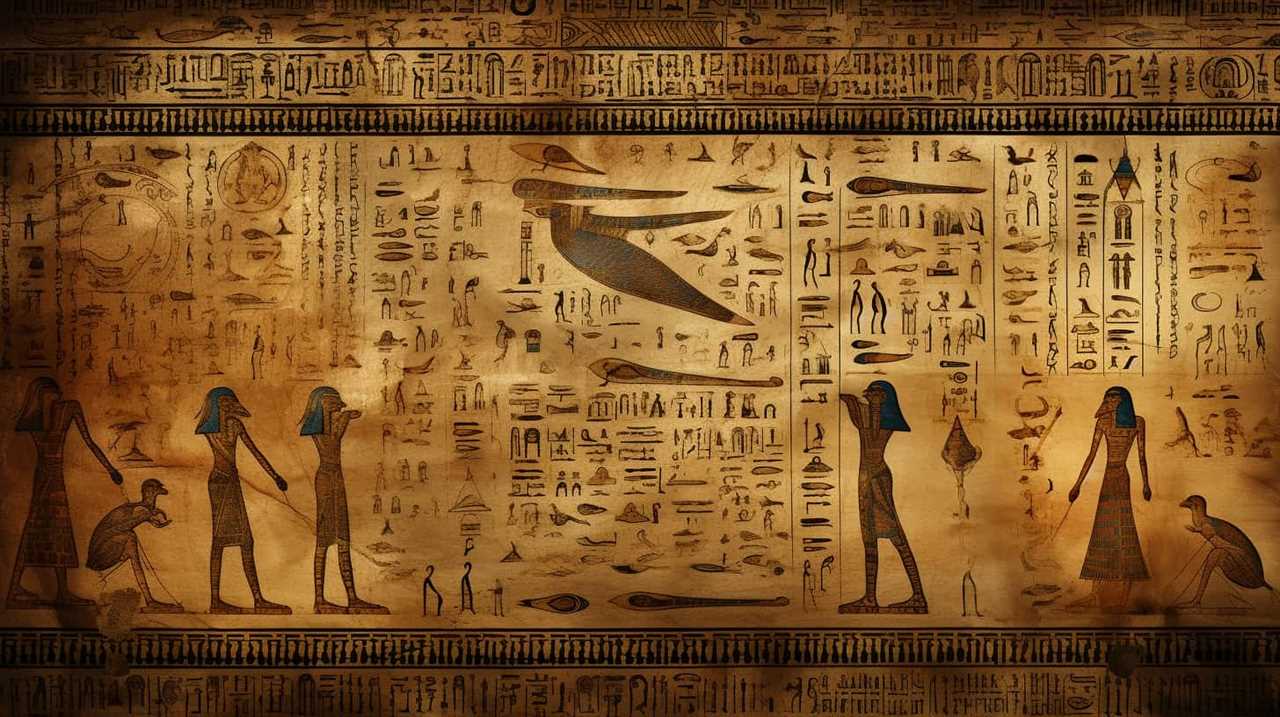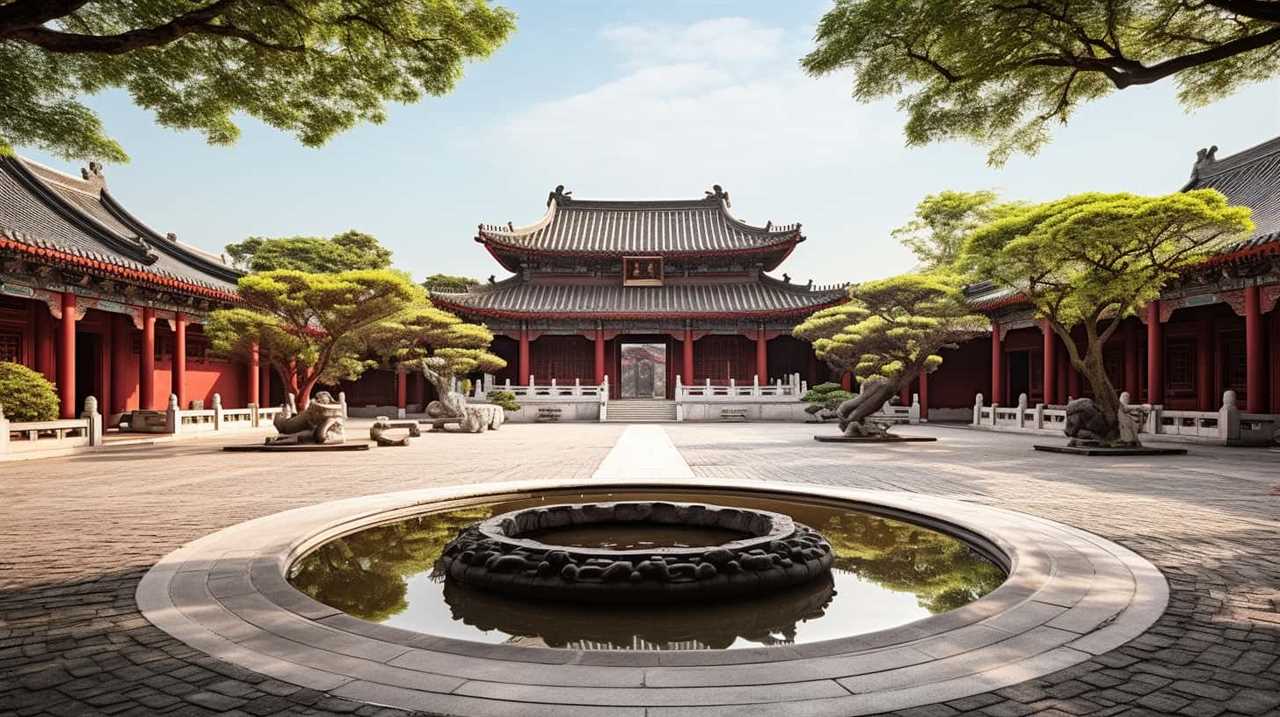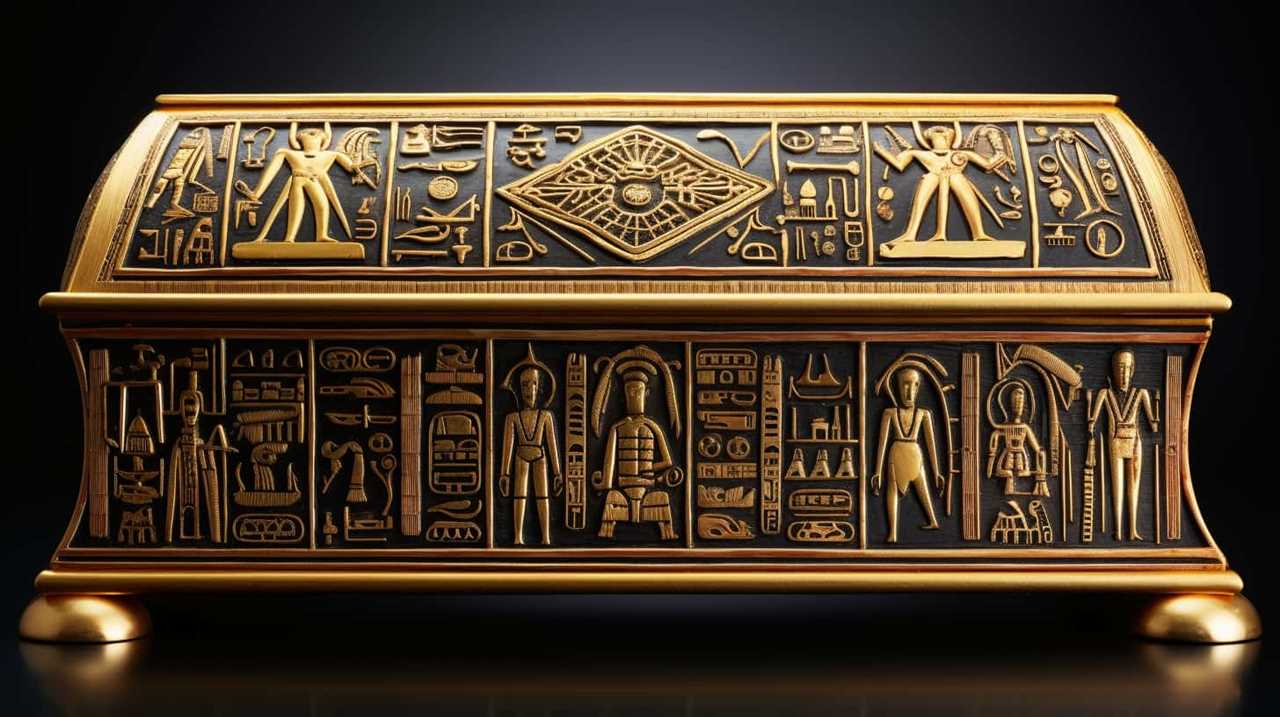Throughout our life’s voyage, we frequently search for direction from different sources to manage the complexities and challenges that come our way. Similarly to how a compass indicates the correct path, ancient Chinese philosophers provide us with significant wisdom to discover meaning and purpose.
Their wisdom, like a wellspring, flows through the ages, offering timeless teachings that resonate with those who desire mastery in life. From the profound insights of Confucius to the poetic musings of Lao Tzu, these philosophers offer profound lessons on the art of living.
They teach us about the importance of harmony, patience, and mindfulness. They remind us to embrace nature’s wisdom and to nurture our relationships and connections.
Join us as we explore the rich tapestry of ancient Chinese philosophy and discover how it can guide us on our own life’s journey.

Key Takeaways
- Cultivating simplicity in life frees us from unnecessary desires and attachments, leading to inner peace and harmony.
- Balance in work-life and harmonious relationships contribute to overall well-being and inner harmony.
- Embracing change and impermanence leads to growth, adaptation, and reduced suffering.
- Mindfulness, self-reflection, and personal growth are crucial in finding inner peace, aligning actions with values, and cultivating happiness and contentment.
The Wisdom of Confucius
When it comes to navigating life’s journey, we can gain valuable insights from the wisdom of Confucius. Confucian teachings continue to hold relevance and can be applied in various aspects of our lives, particularly in relationships.
Confucius emphasized the importance of cultivating virtuous qualities and maintaining harmonious interactions with others.
In today’s fast-paced and interconnected world, relationships play a crucial role in our personal and professional lives. Confucius believed that wisdom in relationships begins with the practice of filial piety, which involves showing respect and care towards our parents and elders. This concept extends beyond the family unit and encompasses our interactions with friends, colleagues, and society as a whole.
Confucian teachings encourage individuals to prioritize moral values such as benevolence, righteousness, and loyalty. These virtues serve as guiding principles for building healthy and meaningful relationships. By embodying these qualities, we can foster trust, understanding, and mutual respect in our interactions with others.

Furthermore, Confucian teachings emphasize the importance of self-improvement and self-reflection. Confucius believed that by continuously striving for personal growth and self-cultivation, we can become better individuals and contribute positively to our relationships and society.
Lao Tzu’s Insights on Life
Lao Tzu’s insights on life offer timeless wisdom that can guide us in our journey.
His teachings emphasize the importance of simplicity as a guide for living, reminding us to let go of unnecessary complexities and find contentment in the present moment.
Lao Tzu also stresses the need for balance and inner harmony, reminding us to cultivate a sense of peace and equilibrium within ourselves.

Timeless Wisdom for Living
We should embrace the timeless wisdom of ancient Chinese philosopher Lao Tzu’s insights on life to enhance our journey. Lao Tzu’s teachings provide us with timeless principles and ancient wisdom that can guide us in navigating the complexities of life.
Here are two key aspects of Lao Tzu’s philosophy that can help us on our path:
- The Way (Tao): Lao Tzu believed in the importance of aligning ourselves with the natural flow of life, known as the Tao. By embracing this concept, we can find harmony and balance, allowing us to navigate challenges with ease.
- Non-Attachment: Lao Tzu emphasized the need to let go of attachments and desires, as they often lead to suffering and unrest. By practicing non-attachment, we can cultivate a sense of inner peace and contentment.
By incorporating these principles into our lives, we can gain valuable insights and guidance on how to live a fulfilling and meaningful existence.
With this understanding, let’s now explore the next section, which focuses on simplicity as life’s guide.

Simplicity as Life’s Guide
One key aspect of Lao Tzu’s philosophy is the role of simplicity as a guiding principle in life. Lao Tzu believed that finding peace and contentment lies in letting go of unnecessary desires and attachments. By embracing simplicity, we can free ourselves from the burdens of material possessions and societal expectations. Lao Tzu’s teachings remind us that true happiness does not come from external achievements, but from inner peace and harmony. In today’s fast-paced and complex world, simplicity serves as a compass, guiding us towards a more meaningful and fulfilling life. It encourages us to focus on what truly matters, to declutter our minds and surroundings, and to cultivate a sense of gratitude for the present moment. Through simplicity, we can find the clarity and tranquility necessary for our life’s journey.
| Finding Peace | Letting Go |
|---|---|
| Inner harmony | Material possessions |
| Contentment | Societal expectations |
| Gratitude | Unnecessary desires |
Balance and Inner Harmony
As we delve further into Lao Tzu’s teachings, we uncover profound insights on achieving balance and inner harmony in our lives. Lao Tzu believed that balance is essential not only in our work life but also in our relationships, as both aspects contribute to our overall well-being. Here are some key insights on achieving balance and inner harmony:
- Balance in work life:
- Strive for a healthy work-life balance by setting clear boundaries and prioritizing self-care.
- Embrace the concept of ‘wu wei’ or effortless action, where we find the balance between exerting effort and going with the flow.
- Inner harmony in relationships:
- Cultivate empathy and understanding in our interactions with others, fostering harmonious connections.
- Practice active listening and open communication to build strong and meaningful relationships.
The Tao Te Ching’s Timeless Teachings
Through its profound insights and practical wisdom, the Tao Te Ching offers timeless teachings that guide us on life’s journey. One of the key teachings of the Tao Te Ching is the importance of simplicity and mindfulness. In a world that’s often chaotic and overwhelming, the Tao Te Ching reminds us to find peace and clarity by embracing simplicity in our thoughts and actions. By letting go of unnecessary desires and attachments, we can cultivate a sense of contentment and inner calm.
Another crucial teaching of the Tao Te Ching is the idea of embracing change and impermanence. The Tao Te Ching teaches us that life is constantly evolving, and resisting change only leads to suffering. Instead, we’re encouraged to flow with the natural rhythm of life, adapting to the ever-changing circumstances. This requires a deep trust in the process and a willingness to let go of control.

The Tao Te Ching’s teachings on simplicity and mindfulness, as well as embracing change and impermanence, are particularly relevant in today’s fast-paced and unpredictable world. By incorporating these teachings into our lives, we can cultivate a sense of balance and harmony, finding peace amidst the chaos. The timeless wisdom of the Tao Te Ching serves as a guide, helping us navigate the challenges of life’s journey with grace and wisdom.
The Art of Living According to Zhuangzi
Now let’s delve into the principles of the Art of Living according to Zhuangzi, an ancient Chinese philosopher. Zhuangzi’s perspective on spontaneity and his teachings on detachment provide valuable insights into how to live a fulfilling and meaningful life.
Zhuangzi believed in the importance of embracing the natural flow of life. According to him, true spontaneity arises when we let go of our attachments and expectations, allowing ourselves to be in harmony with the ever-changing world around us. By aligning ourselves with the natural order of things, we can experience a sense of freedom and joy that comes from living in the present moment.
Furthermore, Zhuangzi emphasized the significance of detachment. He taught that attachment to external things, such as material possessions or societal expectations, leads to suffering and dissatisfaction. Instead, he encouraged individuals to cultivate a sense of inner detachment, where one isn’t swayed by external circumstances or desires. Through this practice, one can attain a state of equanimity and find contentment in the present moment.

In conclusion, Zhuangzi’s perspective on spontaneity and teachings on detachment offer valuable guidance for living a balanced and fulfilling life. By embracing spontaneity and practicing detachment, we can cultivate a sense of harmony within ourselves and with the world around us.
Now, let’s explore the importance of harmony in our journey towards a meaningful existence.
The Importance of Harmony
When considering the importance of harmony, two key points come to mind.
First, balance in relationships is crucial for maintaining harmony in our lives. This means finding a middle ground, where we can respect and understand others while also asserting our own needs and boundaries.

Second, inner peace can be achieved through the unity of mind, body, and spirit. When we’re in harmony with ourselves, we’re able to navigate life’s challenges with clarity and grace.
Balance in Relationships
Maintaining harmony in our relationships is crucial for a balanced and fulfilling life journey. In order to achieve this balance, it’s important to establish and maintain healthy boundaries within our relationships.
Setting clear boundaries allows us to maintain our individuality while also respecting the needs and boundaries of others. This helps create an environment of mutual respect and understanding, fostering a sense of harmony between individuals.
Additionally, effective communication skills play a vital role in maintaining balance in relationships. By expressing our thoughts and feelings openly and honestly, we can avoid misunderstandings and conflicts, promoting a harmonious connection with others.

Developing these skills allows us to navigate the complexities of relationships with grace and understanding, enhancing our overall life journey.
Inner Peace Through Unity
To achieve inner peace, we must strive for unity and harmony with those around us. Inner peace is not a solitary pursuit; it is found through our connections with others. The ancient Chinese philosophers understood the importance of unity in diversity and finding peace within chaos. They believed that when individuals come together, they create a harmonious whole that is greater than the sum of its parts. This concept can be explained using a two-column, five-row table:
| Unity in Diversity | Finding Peace within Chaos |
|---|---|
| Recognizing and embracing differences | Cultivating calmness in turbulent times |
| Appreciating the unique qualities of each individual | Seeking balance amidst disorder |
| Promoting inclusivity and collaboration | Adapting to change and uncertainty |
| Valuing diverse perspectives and opinions | Focusing on the present moment |
| Creating a sense of belonging and community | Letting go of control and surrendering to the flow of life |
The Power of Balance in Life
Achieving equilibrium is essential for us to navigate the complexities of life, as ancient Chinese philosophers have long emphasized. In our modern world, where the demands of work and personal life often clash, finding a balance becomes even more crucial.
The concept of work-life balance has gained significant attention in recent years, highlighting the need to prioritize both professional and personal responsibilities. However, achieving work-life balance goes beyond simply dividing our time between work and leisure. It requires a deeper understanding of our own needs and the importance of self-care.
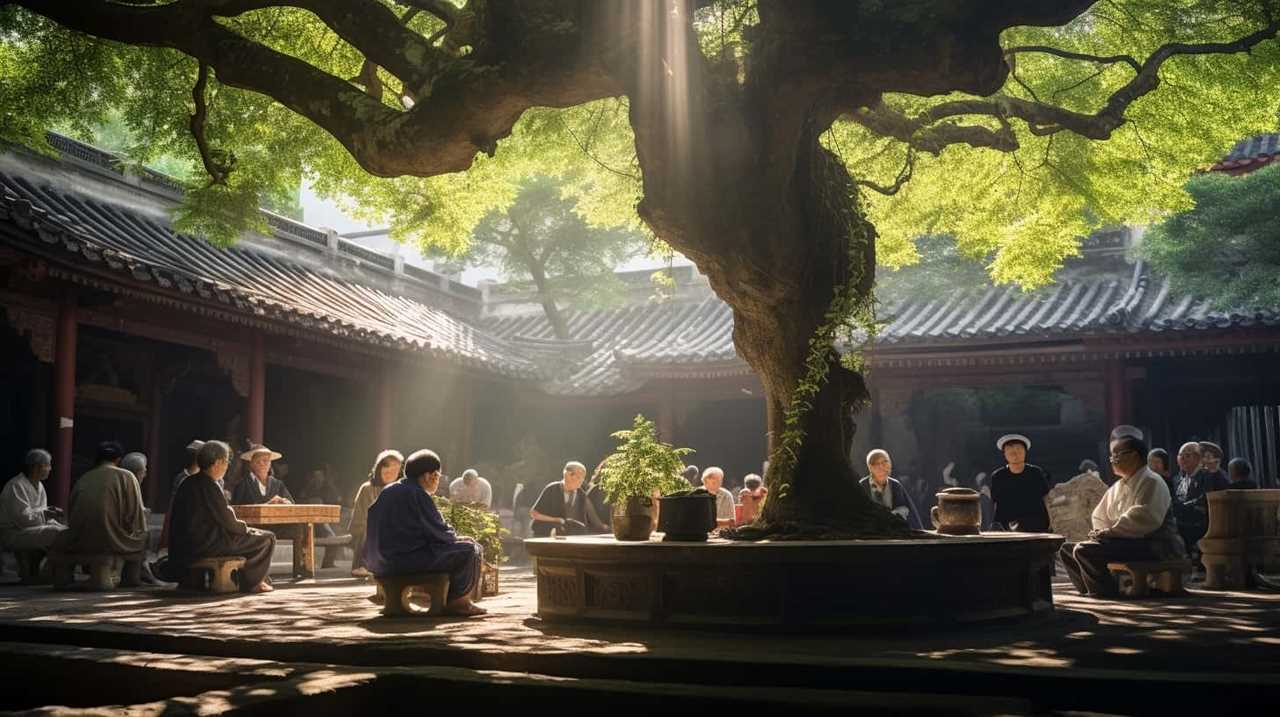
To truly achieve work-life balance, we must:
- Prioritize self-care: Taking care of ourselves physically, mentally, and emotionally is essential for overall well-being. This includes getting enough rest, engaging in activities we enjoy, and seeking support when needed.
- Set boundaries: Establishing clear boundaries between work and personal life helps prevent burnout and allows us to fully engage in both areas. This may involve setting strict working hours, avoiding work-related activities during personal time, and learning to say no when necessary.
Embracing Change and Impermanence
Embracing change and impermanence allows us to navigate the complexities of life with resilience and adaptability. Cultivating adaptability is essential in a world that’s constantly evolving. It requires an understanding that change is inevitable and embracing it allows us to thrive in an ever-changing environment.
In ancient Chinese philosophy, the concept of impermanence is deeply ingrained. The belief that nothing is permanent, and everything is in a state of constant flux, serves as a reminder to embrace the impermanence of life. By accepting that nothing lasts forever, we can let go of attachments and expectations, allowing us to flow with the natural rhythm of life.
When we resist change or cling to the past, we create unnecessary suffering for ourselves. However, when we embrace change, we open ourselves up to new possibilities and opportunities. We become more flexible, adaptable, and resilient in the face of challenges.
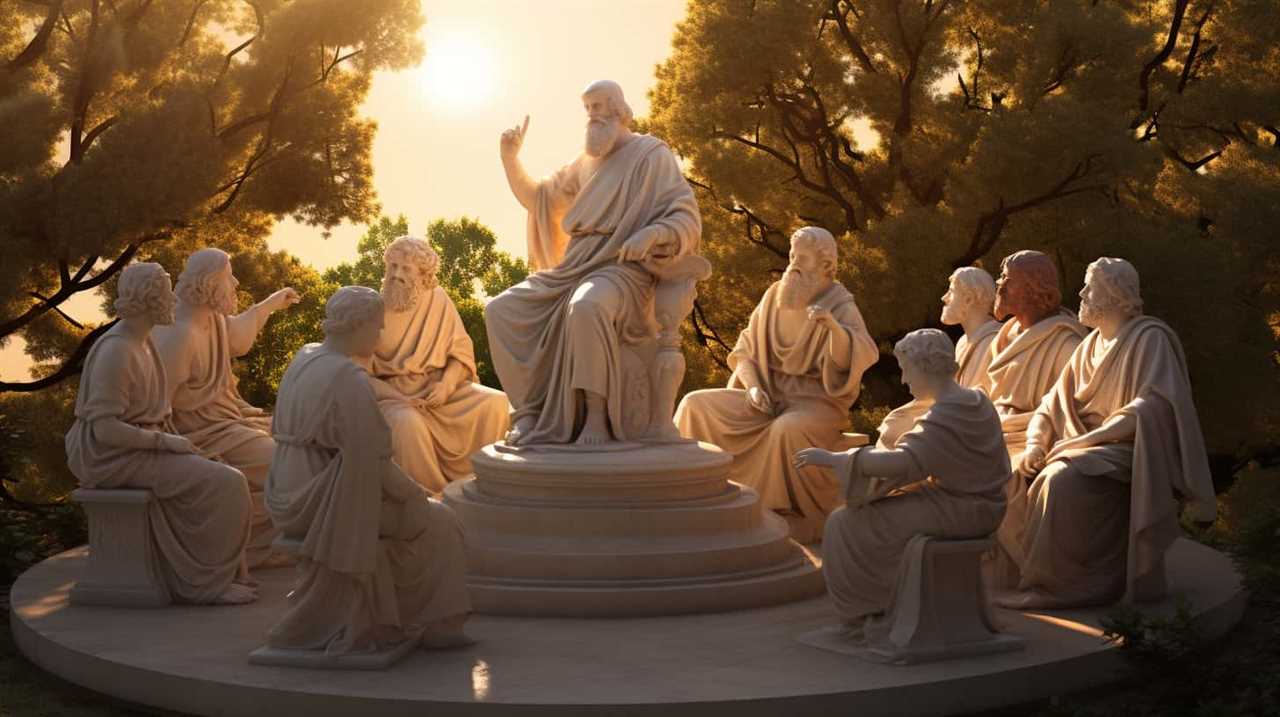
Cultivating adaptability requires a mindset shift. It involves letting go of the need for control and embracing uncertainty. It means being open to learning, growth, and transformation. By embracing change and impermanence, we develop the ability to navigate life’s ups and downs with grace and ease.
The Path to Inner Peace
When it comes to finding inner peace, mindfulness plays a crucial role. By being present in the moment and fully aware of our thoughts and emotions, we can cultivate a sense of calm and tranquility within ourselves.
Additionally, finding balance within is essential for inner peace. It involves recognizing and honoring our needs, setting boundaries, and prioritizing self-care.
Through mindfulness and finding balance, we can embark on a path towards inner peace and create a harmonious life.

Mindfulness for Inner Peace
On our life’s journey, we can discover inner peace through the practice of mindfulness. Mindful living is a powerful tool that allows us to cultivate peace of mind amidst the chaos of daily life. By bringing our full attention to the present moment, we can free ourselves from worries about the past or future, and experience a sense of calm and clarity.
To achieve inner peace through mindfulness, consider the following:
- Cultivate awareness: Pay attention to your thoughts, emotions, and physical sensations without judgment. This self-awareness will help you recognize and let go of negative patterns that disrupt your peace of mind.
- Practice meditation: Dedicate time each day to sit in stillness and observe your breath. This practice trains your mind to focus and be present, leading to a greater sense of inner peace.
Finding Balance Within
To find balance within ourselves and discover the path to inner peace, we must prioritize self-reflection and incorporate ancient wisdom from Chinese philosophers.
Finding inner peace and achieving harmony within ourselves is a lifelong journey that requires dedicated effort and introspection. Chinese philosophers, such as Laozi and Confucius, emphasize the importance of self-awareness and self-cultivation in order to attain a state of tranquility and balance.

By reflecting on our thoughts, emotions, and actions, we can identify areas of imbalance and work towards restoring harmony within ourselves. This process involves acknowledging and accepting our strengths and weaknesses, embracing our imperfections, and striving for personal growth and development.
By incorporating the teachings of these ancient philosophers into our daily lives, we can navigate the complexities of modern existence and cultivate a sense of inner peace.
Transitioning into the subsequent section about ‘cultivating virtue for a fulfilling life’, let’s now explore how these teachings can guide us towards a life filled with purpose and fulfillment.
Cultivating Virtue for a Fulfilling Life
In our pursuit of a fulfilling life, cultivating virtue is essential to our journey. Ancient Chinese philosophers understood the importance of virtue in personal growth and finding fulfillment in everyday actions. Let’s delve into this concept further:

- Cultivating virtue for personal growth: Ancient Chinese philosophers believed that true fulfillment comes from developing virtuous qualities within ourselves. By cultivating virtues such as kindness, compassion, and honesty, we not only enhance our own character but also positively impact those around us. This process of self-improvement leads to personal growth and a deeper understanding of ourselves.
- Finding fulfillment in everyday actions: According to ancient Chinese wisdom, true fulfillment isn’t reserved for extraordinary achievements but can be found in the simplest of actions. By embracing virtues like gratitude, patience, and humility, we learn to appreciate the beauty and significance of everyday moments. These virtues allow us to find contentment and joy in the present, instead of constantly chasing external validation or future accomplishments.
Finding Happiness Through Simplicity
When it comes to finding happiness, the ancient Chinese philosophers highlight the importance of embracing minimalism and simplifying our lives. By stripping away the excess and focusing on what truly matters, we can create a sense of contentment and fulfillment.
This perspective encourages us to reevaluate our priorities, letting go of material possessions and unnecessary distractions in order to find genuine happiness in the simplicity of life.
Embracing Minimalism for Happiness
Our journey towards happiness can be greatly enhanced by embracing the minimalist principles of ancient Chinese philosophers. Minimalism not only brings simplicity to our physical surroundings but also fosters personal growth and inner peace. By decluttering our lives, we create space for what truly matters, allowing us to focus on our goals and priorities.
Embracing minimalism offers several benefits for finding happiness:

- Clarity and Focus: Removing unnecessary distractions enables us to concentrate on what brings us joy and fulfillment. It helps us identify our values and align our actions with them.
- Freedom from Materialism: Letting go of excess possessions allows us to break free from the constant cycle of consumerism. We discover that true happiness lies in experiences, relationships, and personal growth, rather than material possessions.
Incorporating minimalist principles into our lives can lead us towards a more meaningful and fulfilling existence. It encourages us to prioritize what truly matters and find happiness through simplicity and decluttering.
Simplifying Life for Contentment
To achieve contentment and find happiness through simplicity, ancient Chinese philosophers encourage simplifying our lives. They believed that excessive material possessions and clutter can lead to dissatisfaction and a lack of inner peace. By embracing minimalist living, we can focus on what truly matters and let go of the unnecessary.
This means decluttering our physical spaces, but also simplifying our schedules and commitments. It involves prioritizing our values and making conscious choices about how we allocate our time, energy, and resources.
By simplifying our lives, we create room for contentment to flourish. We can find joy in the present moment, appreciate the beauty of simplicity, and cultivate a sense of gratitude for what we already have.

Ultimately, finding contentment isn’t about acquiring more, but about embracing less and living with intention.
The Value of Self-Reflection
In the pursuit of a meaningful existence, embracing self-reflection holds significant value. Taking the time to look inward and examine our thoughts, emotions, and actions can provide immense insight and contribute to personal growth. The value of introspection can’t be overstated, as it allows us to gain a deeper understanding of ourselves and the world around us.
Consider the following benefits of self-examination:
- Enhanced self-awareness: Engaging in self-reflection helps us become more in tune with our thoughts, feelings, and behaviors. By examining our inner landscape, we can identify patterns, strengths, and areas for improvement. This heightened self-awareness empowers us to make conscious choices aligned with our values and goals.
- Improved decision-making: Through self-reflection, we gain clarity on our priorities and values. This enables us to make more informed decisions that align with our true desires and aspirations. By understanding ourselves better, we can navigate life’s choices with confidence and purpose.
- Personal growth and development: Self-reflection provides an opportunity for personal growth and development. By identifying areas of improvement, we can actively work towards enhancing our skills, attitudes, and behaviors. This continuous self-improvement journey can lead to increased self-confidence, resilience, and overall well-being.
- Deeper connections with others: When we take the time to reflect on our own experiences and emotions, we become more empathetic and understanding towards others. Self-reflection allows us to cultivate a greater sense of compassion and develop stronger connections with those around us.
The Virtue of Patience and Perseverance
As we embark on life’s journey, it is crucial to recognize the virtue of patience and perseverance. These qualities are essential for navigating the challenges and obstacles we encounter along the way. Endurance is the ability to withstand difficulties and maintain a steadfast commitment to our goals, while cultivating resilience allows us to bounce back from setbacks and continue moving forward.

To truly understand the importance of endurance and resilience, let us consider the following table:
| Endurance | Resilience |
|---|---|
| Persistence | Adaptability |
| Perseverance | Flexibility |
| Determination | Resourcefulness |
| Tenacity | Mental strength |
| Steadfastness | Emotional fortitude |
Endurance is the fuel that keeps us going when faced with adversity. It is the driving force behind our ability to persevere in the face of challenges, setbacks, and even failures. Cultivating resilience, on the other hand, allows us to adapt to changing circumstances, learn from our experiences, and emerge stronger and more capable.
Embracing Nature’s Wisdom
Embracing nature’s wisdom involves connecting with the natural world and learning from its inherent lessons. In a fast-paced and technologically-driven society, finding solace in nature is more important than ever. The healing power of the outdoors can provide us with a sense of calm and tranquility, helping us to escape the stresses and pressures of everyday life.
To fully embrace nature’s wisdom, we must first open our minds and hearts to its teachings. Here are two key lessons we can learn from the natural world:
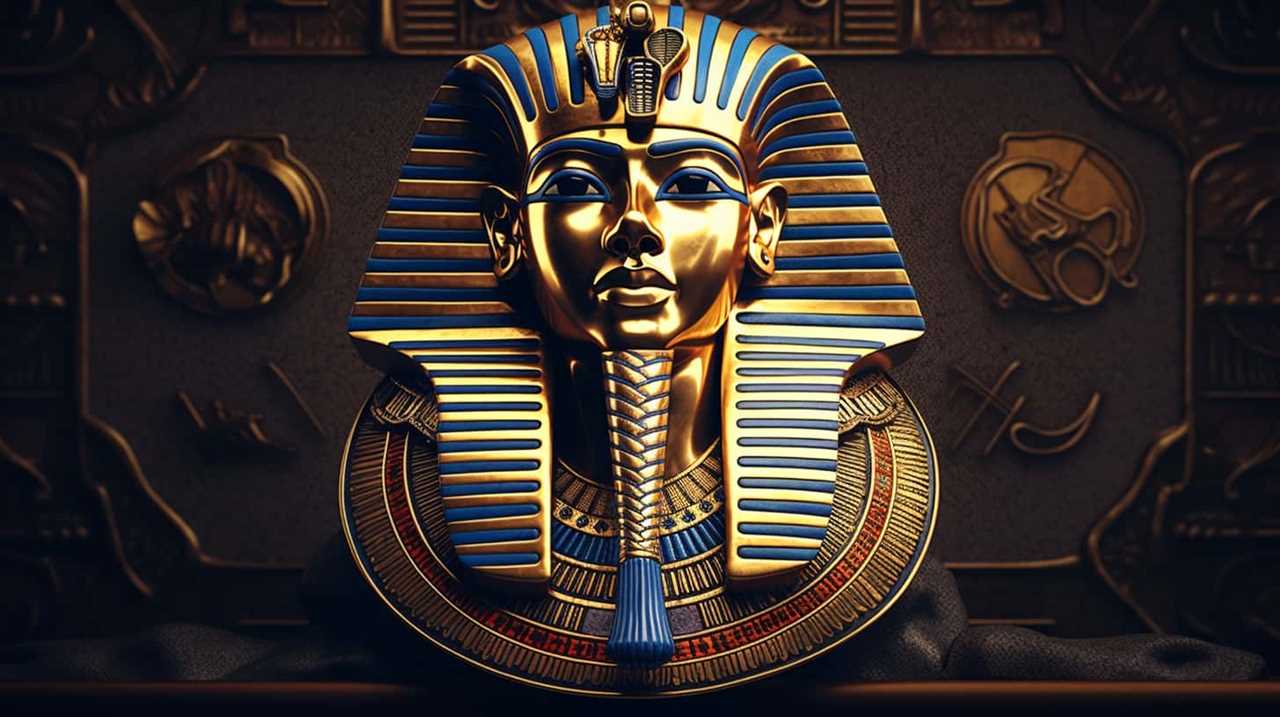
- Impermanence: Nature teaches us that everything is constantly changing and evolving. Seasons change, flowers bloom and wither, and rivers flow and shift. By observing and accepting this impermanence, we can learn to let go of attachments and embrace the flow of life.
- Interconnectedness: Nature shows us that everything is interconnected. From the smallest insect to the tallest tree, every living being is part of a larger ecosystem. This teaches us the importance of our own connections with others and the environment, reminding us that we’re all part of something greater.
The Role of Mindfulness in Daily Life
To fully embrace the wisdom of nature, we must cultivate mindfulness in our daily lives, allowing us to be present and aware of the interconnectedness of the world around us. Mindfulness isn’t limited to meditation or spiritual practices; it can also play a crucial role in our relationships and in the workplace.
In relationships, mindfulness enables us to truly listen and be present with our loved ones. It allows us to let go of distractions and judgments, fostering deeper connections and understanding. By practicing mindfulness in our interactions, we can cultivate empathy, compassion, and acceptance, which are essential for healthy and fulfilling relationships.
In the workplace, mindfulness can enhance our productivity and well-being. It helps us focus on the task at hand, reducing stress and increasing our ability to make clear decisions. Mindfulness also promotes effective communication and collaboration, as it encourages active listening and open-mindedness. By practicing mindfulness in the workplace, we can create a harmonious and supportive environment, where creativity and innovation thrive.
The Importance of Relationships and Connections
In our journey through life, we thrive through the meaningful relationships and connections we forge. These connections not only provide us with a sense of belonging but also play a crucial role in our personal growth and development.

Let’s explore the importance of relationships and connections in more detail:
- The power of empathy: Empathy is the ability to understand and share the feelings of others. Building strong relationships allows us to cultivate empathy, enabling us to connect with others on a deeper level. By putting ourselves in someone else’s shoes, we can better understand their experiences, perspectives, and emotions. This fosters compassion, strengthens bonds, and promotes a more harmonious community.
- The importance of community: Humans are social beings by nature, and being part of a community provides a sense of support, collaboration, and belonging. Communities offer a network of relationships that offer emotional support during challenging times and celebrate our successes. By actively participating in communities, we can contribute to the collective well-being, create a positive impact, and establish lasting connections that enrich our lives.
Frequently Asked Questions
How Can Ancient Chinese Philosophies Help Us Achieve Inner Peace?
Practical tips from ancient Chinese philosophies can help us achieve inner peace. Benefits of mindfulness include increased self-awareness, reduced stress, and improved emotional well-being. Incorporating these practices into our lives can lead to a more fulfilling and balanced existence.
What Are Some Practical Ways to Cultivate Virtue in Our Daily Lives?
Cultivating values and moral development in our daily lives is crucial for personal growth. For example, practicing honesty by admitting mistakes and taking responsibility can lead to a stronger sense of integrity and character.
How Can Embracing Change and Impermanence Improve Our Overall Well-Being?
Embracing change and impermanence can improve our overall well-being by teaching us to find contentment in the present moment. When we accept that everything is constantly changing, we can let go of attachment and find peace within ourselves.

What Is the Significance of Self-Reflection in Finding Happiness and Fulfillment?
Self-reflection plays a vital role in our pursuit of happiness and fulfillment. By cultivating mindfulness and self-awareness, we gain a deeper understanding of ourselves, enabling us to overcome obstacles and achieve our personal goals.
How Can Ancient Chinese Philosophies Guide Us in Building Meaningful Relationships and Connections?
Building empathy and cultivating harmony, ancient Chinese philosophies offer valuable insights into the art of building meaningful relationships and connections. By studying their wisdom, we can learn to navigate the complexities of human interactions with grace and wisdom.
How Can Ancient Chinese Philosophers’ Quotes Impact Modern Life’s Journey?
The wisdom found in lifechanging Chinese philosophers’ quotes continues to inspire and guide people on their modern life’s journey. The profound insights of ancient Chinese thinkers like Confucius and Lao Tzu offer timeless wisdom on topics such as morality, harmony, and personal growth. Their words still resonate and shape lives today.
Conclusion
In conclusion, the wisdom of ancient Chinese philosophers continues to hold relevance in our modern lives. Their teachings on harmony, patience, and embracing nature’s wisdom provide valuable insights on how to navigate life’s journey.
By practicing mindfulness and cultivating meaningful relationships, we can find fulfillment and purpose.

So, why not heed the guidance of these ancient philosophers? After all, their timeless wisdom has the power to transform our lives.
Will we choose to embrace it?
Fritz is a writer whose humor and wit infuse life into words. His creativity, combined with a profound love for the English language, makes him a unique voice at afterQuotes. Fritz’s engagement with books, culture, and social media adds depth to his contributions, making them resonate with our diverse audience.

